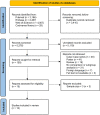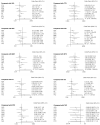Effectiveness and tolerability of different therapies in preventive treatment of MOG-IgG-associated disorder: A network meta-analysis
- PMID: 35958613
- PMCID: PMC9360318
- DOI: 10.3389/fimmu.2022.953993
Effectiveness and tolerability of different therapies in preventive treatment of MOG-IgG-associated disorder: A network meta-analysis
Abstract
Background: Immunotherapy has been shown to reduce relapses in patients with myelin oligodendrocyte glycoprotein antibody-associated disorder (MOG-AD); however, the superiority of specific treatments remains unclear.
Aim: To identify the efficacy and tolerability of different treatments for MOG-AD.
Methods: Systematic search in Pubmed, Embase, Web of Science, and Cochrane Library databases from inception to March 1, 2021, were performed. Published articles including patients with MOG-AD and reporting the efficacy or tolerability of two or more types of treatment in preventing relapses were included. Reported outcomes including incidence of relapse, annualized relapse rate (ARR), and side effects were extracted. Network meta-analysis with a random-effect model within a Bayesian framework was conducted. Between group comparisons were estimated using Odds ratio (OR) or mean difference (MD) with 95% credible intervals (CrI).
Results: Twelve studies that compared the efficacy of 10 different treatments in preventing MOG-AD relapse, including 735 patients, were analyzed. In terms of incidence of relapse, intravenous immunoglobulins (IVIG), oral corticosteroids (OC), mycophenolate mofetil (MMF), azathioprine (AZA), and rituximab (RTX) were all significantly more effective than no treatment (ORs ranged from 0.075 to 0.34). On the contrary, disease-modifying therapy (DMT) (OR=1.3, 95% CrI: 0.31 to 5.0) and tacrolimus (TAC) (OR=5.9, 95% CrI: 0.19 to 310) would increase the incidence of relapse. Compared with DMT, IVIG significantly reduced the ARR (MD=-0.85, 95% CrI: -1.7 to -0.098). AZA, MMF, OC and RTX showed a trend to decrease ARR, but those results did not reach significant differences. The combined results for relapse rate and adverse events, as well as ARR and adverse events showed that IVIG and OC were the most effective and tolerable therapies.
Conclusions: Whilst DMT should be avoided, IVIG and OC may be suited as first-line therapies for patients with MOG-AD. RTX, MMF, and AZA present suitable alternatives.
Keywords: adverse events; meta-analysis; myelin oligodendrocyte glycoprotein antibody-associated disorder (MOG-AD); relapse rate; treatment.
Copyright © 2022 Wang, Kong, Zhao, Shi, Chen, Lang, Lin, Du and Zhou.
Conflict of interest statement
The authors declare that the research was conducted in the absence of any commercial or financial relationships that could be construed as a potential conflict of interest.
Figures




Similar articles
-
Prophylactic antibiotics for adults with chronic obstructive pulmonary disease: a network meta-analysis.Cochrane Database Syst Rev. 2021 Jan 15;1(1):CD013198. doi: 10.1002/14651858.CD013198.pub2. Cochrane Database Syst Rev. 2021. PMID: 33448349 Free PMC article.
-
Treatments for chronic inflammatory demyelinating polyradiculoneuropathy (CIDP): an overview of systematic reviews.Cochrane Database Syst Rev. 2017 Jan 13;1(1):CD010369. doi: 10.1002/14651858.CD010369.pub2. Cochrane Database Syst Rev. 2017. PMID: 28084646 Free PMC article.
-
A systematic review and economic model of the clinical and cost-effectiveness of immunosuppressive therapy for renal transplantation in children.Health Technol Assess. 2006 Dec;10(49):iii-iv, ix-xi, 1-157. doi: 10.3310/hta10490. Health Technol Assess. 2006. PMID: 17134597
-
Immunosuppressive treatment for proliferative lupus nephritis.Cochrane Database Syst Rev. 2018 Jun 29;6(6):CD002922. doi: 10.1002/14651858.CD002922.pub4. Cochrane Database Syst Rev. 2018. PMID: 29957821 Free PMC article.
-
Maintenance immunosuppression for adults undergoing liver transplantation: a network meta-analysis.Cochrane Database Syst Rev. 2017 Mar 31;3(3):CD011639. doi: 10.1002/14651858.CD011639.pub2. Cochrane Database Syst Rev. 2017. PMID: 28362060 Free PMC article.
Cited by
-
Humoral signatures of MOG-antibody-associated disease track with age and disease activity.Cell Rep Med. 2023 Feb 21;4(2):100913. doi: 10.1016/j.xcrm.2022.100913. Epub 2023 Jan 19. Cell Rep Med. 2023. PMID: 36669487 Free PMC article.
-
The influence of MOGAD on diagnosis of multiple sclerosis using MRI.Nat Rev Neurol. 2024 Oct;20(10):620-635. doi: 10.1038/s41582-024-01005-2. Epub 2024 Sep 3. Nat Rev Neurol. 2024. PMID: 39227463 Review.
-
Acute-Onset Blindness in a Patient Diagnosed With Myelin Oligodendrocyte Glycoprotein Antibody Disease (MOG-AD): A Case Report.Cureus. 2024 Jun 5;16(6):e61767. doi: 10.7759/cureus.61767. eCollection 2024 Jun. Cureus. 2024. PMID: 38975430 Free PMC article.
-
Chimeric antigen receptor T-cell therapy for autoimmune diseases of the central nervous system: a systematic literature review.J Neurol. 2024 Oct;271(10):6526-6542. doi: 10.1007/s00415-024-12642-4. Epub 2024 Sep 14. J Neurol. 2024. PMID: 39276207 Free PMC article.
-
Tailoring Rituximab According to CD27-Positive B-Cell versus CD19-Positive B-Cell Monitoring in Neuromyelitis Optica Spectrum Disorder and MOG-Associated Disease: Results from a Single-Center Study.Neurol Ther. 2023 Aug;12(4):1375-1383. doi: 10.1007/s40120-023-00481-w. Epub 2023 May 11. Neurol Ther. 2023. PMID: 37166677 Free PMC article.
References
Publication types
MeSH terms
Substances
LinkOut - more resources
Full Text Sources

